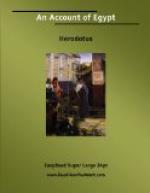With regard then to the rearing of the children they related so much as I have said: and I heard also other things at Memphis when I had speech with the priests of Hephaistos. Moreover I visited both Thebes and Heliopolis for this very cause, namely because I wished to know whether the priests at these places would agree in their accounts with those at Memphis; for the men of Heliopolis are said to be the most learned in records of the Egyptians. Those of their narrations which I heard with regard to the gods I am not earnest to relate in full, but I shall name them only because I consider that all men are equally ignorant of these matters: and whatever things of them I may record I shall record only because I am compelled by the course of the story. But as to those matters which concern men, the priests agreed with one another in saying that the Egyptians were the first of all men on earth to find out the course of the year, having divided the seasons into twelve parts to make up the whole; and this they said they found out from the stars: and they reckon to this extent more wisely than the Hellenes, as it seems to me, inasmuch as the Hellenes throw in an intercalated month every other year, to make the seasons right, whereas the Egyptians, reckoning the twelve months at thirty days each, bring in also every year five days beyond number, and thus the circle of their season is completed and comes round to the same point whence it set out. They said moreover that the Egyptians were the first who brought into use appellations for the twelve gods and the Hellenes took up the use from them; and that they were the first who assigned altars and images and temples to the gods, and who engraved figures on stones; and with regard to the greater number of these things they showed me by actual facts that they had happened so. They said also that the first man who became king of Egypt was Min; and that in his time all Egypt except the district of Thebes was a swamp, and none of the regions were then above water which now lie below the lake of Moiris,




